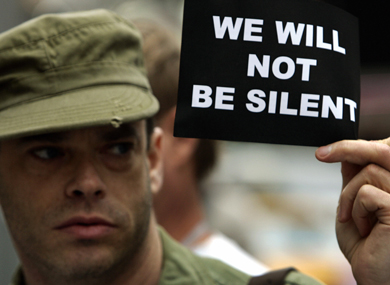DADT Is Over (Finally)
This is kind of a big deal. Finally, the military cannot discharge or in any way penalize someone for being gay. To hear opponents talk about it, you’d think that the army should have collapsed by now; the Family Research Council now thinks that there will be rampant sexual assault and “forced sodomy” in the military and John McCain has stated that repeal would result in more deaths. In reality, September 20 should go down in American history as the day when the military took its head out of the sand and accepted basic human rights.
One of the most popular arguments opposing repeal was that the army should be held to a higher standard of morality than civilians. So, the theory goes, it’s not a big deal for two guys in San Francisco to live together because it doesn’t impact national security. But throw those men into Iraq, and suddenly there’s a problem. And I’m sorry, religious right; you can’t force your own sense of religious morality on the whole country. The whole argument just seems a little silly. If the army was concerned with morality, we wouldn’t even be in Iraq in the first place. If the army was concerned with morality, Abu Ghraib would never have happened. Then there’s the unit cohesion argument. This one essentially says that it’s not the gay person that’s the problem; it’s the reaction of the straight soldiers. Its supporters argue that the close living quarters would make it awkward and difficult to function as a unit. This argument, too, is pretty easily blown out of the water. Other countries, like Israel and Canada, have had gays and lesbians serve openly with no real problems. And as far as close quarters go, I find it hard to imagine that the members of a gay soldier’s unit would not know about their fellow soldier’s private lives. It just doesn’t seem to bother most soldiers; when there are bullets whizzing over head, sexual orientation doesn’t mean anything if you can’t help your unit members get out alive.
The best part of the repeal of the law is how little fuss it actually made. There were some very emotional moments for individual soldiers and their friends and families, of course, but the military itself carried on like it was any other day. That’s the essential point of the argument in favor of repeal; being gay or straight has absolutely no bearing on what a person can do in any job, be it military or otherwise. The polls indicate overwhelmingly that the public believes DADT is bad policy. In December 2010, the Washington Post and ABC undertook a survey to see how people felt about the issue. The results were astounding. 77 percent felt that gays and lesbians should be able to serve openly. That number includes, not surprisingly, 92 percent of liberals and 86 percent of Democrats, but it also includes 74 Percent of Republicans and 67 percent of conservatives. This issue shouldn’t even be an issue. In a republic, laws backed by large sections of almost every demographic should be easily passed, but apparently it doesn’t quite work that way with the current Congress.
It comes down to a fundamental misunderstanding of the modern conservative movement. People saw the Tea Party rise in response to taxes. But that isn’t the whole story. The Tea Party rose in response to what many on the right have for years seen as creeping liberal domination. The apocalyptic rhetoric that we don’t even register anymore is not a new phenomenon. Things weren’t exactly polite during much of the Clinton administration, and the vitriol over the Iraq war and tax cuts for the rich caused conservatives to ready for war. After Obama’s sweeping victory, they went into crisis mode. Suddenly the Tea Party is born, and those people attacking Obama as a socialist are the same conservative, religious people who backed the Moral Majority and the Reagan tax cuts. The issues haven’t even changed. It’s still about homosexuality, abortion, taxes, social welfare, and overseas entanglements. These people are the same minority of voters who have always held their noses while they voted for Republicans, angry about any compromise and decrying some in the party as flat out liberals. It is no surprise, then, that the politicians who garner support from this group are willing to blatantly ignore public opinion. The ones who vote in the primaries and give the money are the only ones those politicians listen to. It would be folly to believe that any sort of bipartisan compromise is coming in the next few years. The repeal of DADT happened in spite of this bitter atmosphere. It was only a matter of time before a measure with three quarters of the country’s support comes to fruition. It’s a shame that our legislative branch cannot be the voice of the people it was designed to be. The only path is to keep forcing the issues that matter and hope that one day enough politicians on the right will wake up and start doing what’s best for the country, not their pocketbooks.











No surprise that 67% of conservatives backed a repeal of DADT. It was a stealth move, designed to forward their agenda through back-door tactics. After all, the more gays in the military, the more gay casualties. Next thing we’ll see will be the right-wingers promoting a campaign to have more atheists in the armed forces.